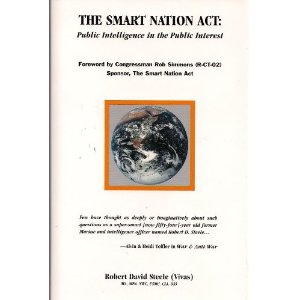
From the Publisher
This book, while available to the public and especially to those who hope to restore informed democracy by reducing secret back room deals and lies based on secrecy, was actually published in order to distribute 1,000 copies to every Senator, every Representative, every Governor, and every Cabinet Officer, as well as 200 American thought leaders and 200 international thought leaders. We must defeat the attempt by the spies to control Open Source Intelligence (OSINT), and instead have the Open Source Agency as a sister agency to the Broadcasting Board of Governors (BBG) under diplomatic auspices. The book provides the road-map for public intelligence in the public interest.
Towards an Informed Public August 12, 2007
This book is really a compilation of the writings of Robert D. Steele that are relevant to the Smart Nation Act. This remarkable piece of legislation was introduced by Congressman Rob Simmons (R, Ct.) in September 2006 and represents an effort to persuade congress to think seriously about the kind of real intelligence reform that Steele has been advocating for close to twenty years. Simmons, like Steele, has a background in intelligence and is a rare informed critic of the U.S. Intelligence System. Needless to say there is neither powerful lobbyist support nor national security establishment support for real intelligence reform. And especially since few voters care one way or the other about such issues, this act will probably go nowhere.
What is commonly forgotten is that intelligence in the CIA sense of the word is simply processed information focused on specific subjects in such a way as to provide unique knowledge of those subjects. Intelligence does not have to be classified. It usually is classified for one of three reasons:1) to protect the sources and methods by which it was produced; 2) to protect bureaucratic turf from rivals; and 3) to prevent the subject(s) of the intelligence from realizing that unauthorized persons are in possession of knowledge about them. Steele correctly maintains that classification hinders the development of real knowledge about a variety of subjects and is largely unnecessary.
The core of the Smart Nation Act and Steele's primary theses is that an Open Source Intelligence Agency based on the free flow of information, the widespread use of outside experts, and the input from everyone including common citizens would provide better and cheaper intelligence than that now obtained from the existing U.S. Intelligence System. This agency would not be the typical hierarchy, but would be organized into semi-autonomous cells of researchers, analysts and experts. Each of the 50 U.S. States would have a local information processing center that would replicate the national Open Source Agency. These local centers would support state level activities requiring intelligence support and provide intelligence information from such sources as first line emergency response teams. Central to this whole concept is that the intelligence accumulated by these agencies would be available to every one so that the U.S. could actually achieve the Jeffersonian dream of an informed public.
So is this so much `pie in the sky' rhetoric and hopelessly impractical? Apparently Representative Simmons doesn't think so and neither does this reviewer.
See Also:
Open Source Agency: Executive Access Point
2012: The Battle for the Soul of the Republic
2012 PREPRINT FOR COMMENT: The Craft of Intelligence
2012 THE OPEN SOURCE EVERYTHING MANIFESTO: Transparency, Truth & Trust
2010 INTELLIGENCE FOR EARTH: Clarity, Diversity, Integrity & Sustainability



